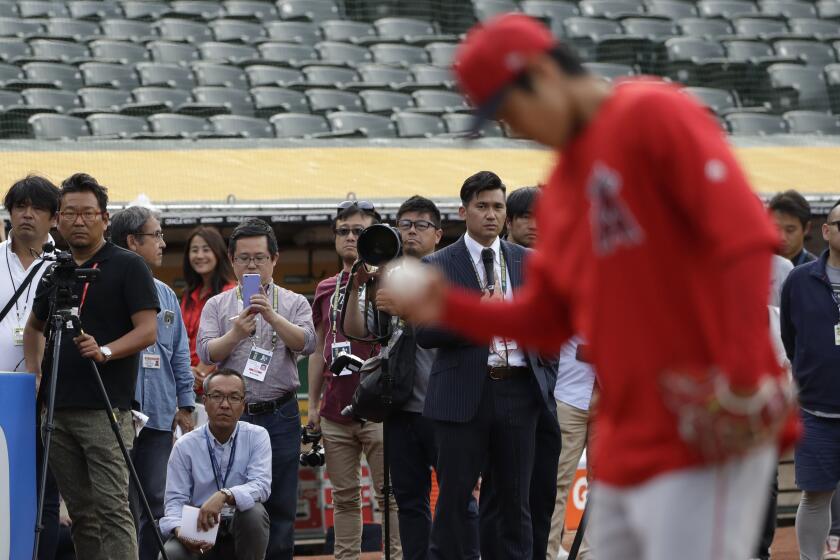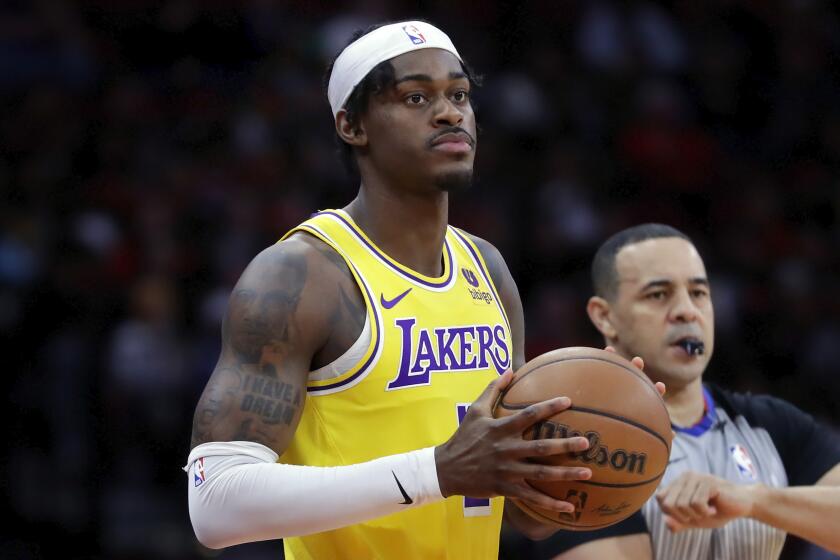‘That’s what everyone wanted to see.’ How Shohei Ohtani fanned Mike Trout to win WBC
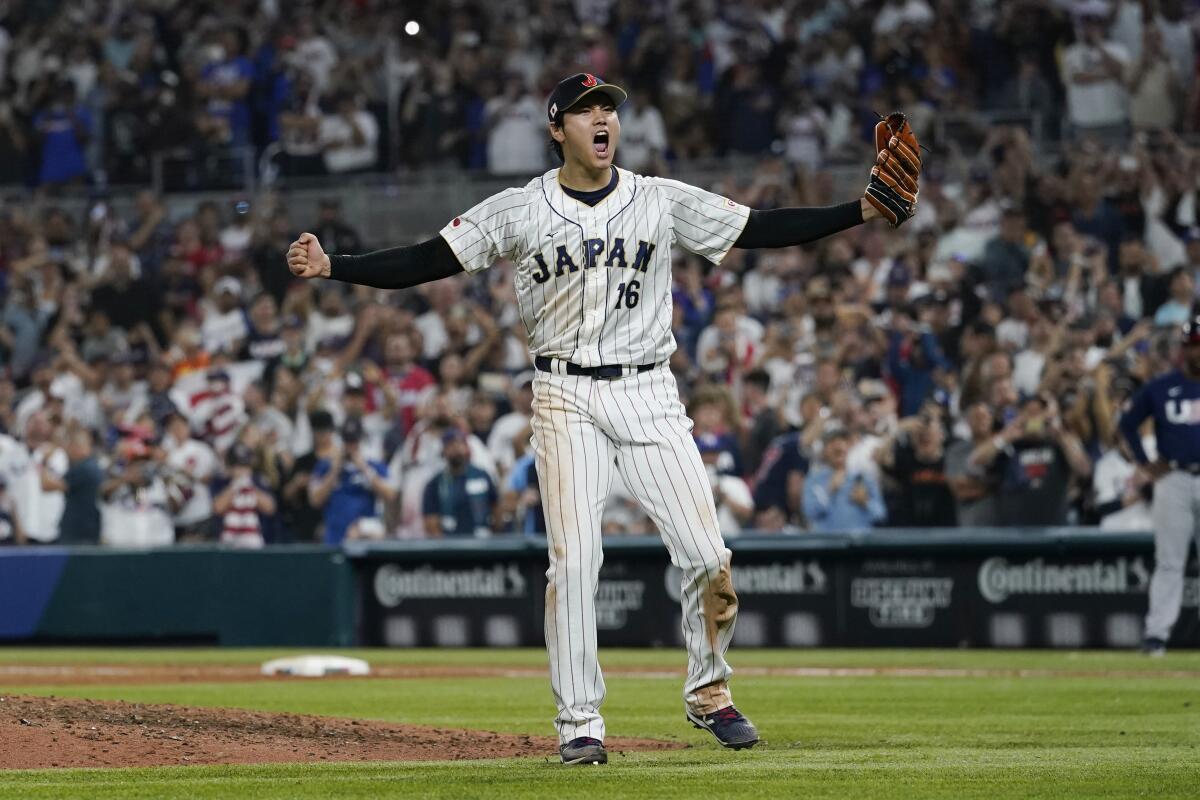
- Share via
MIAMI — The two teams, representing the world’s two longstanding baseball superpowers, entered the field at LoanDepot Park on Tuesday night in a single file from each outfield corner. The United States walked in from right field. Japan was across the way. Leading the line for each star-studded group were the two best players in the world.
Shohei Ohtani and Mike Trout, the captains, carried their respective country’s flags. Three weeks ago, they were Angels teammates in spring training together. They will be together again in Arizona by the end of the week, going through the final preparations for the Angels’ crucial season. But on Tuesday they were opponents for the World Baseball Classic championship, the biggest game of their baseball lives.
Trout’s role for the night was known from the outset. It was the same as always. Batting second and playing center field. Ohtani was a different, mysterious story. The two-way star was again batting third as Japan’s designated hitter. Looming, however, was the chance he would emerge from the bullpen to pitch with the game on the line. Maybe even against Trout.
It was a scintillating possibility. Almost too good to be true. And yet it happened in Japan’s captivating 3-2 win. Ohtani emerged from Japan’s bullpen in left field, his uniform dirty from attempting to break up a double play earlier in the game, just after 10:30 p.m. Eastern time to protect a one-run lead, three outs from securing the championship. It was the right-hander’s first relief appearance since 2016, before joining the Angels. Due up in the top of the ninth inning for Team USA: Jeff McNeil, Mookie Betts and Trout.
McNeil began the inning by working a seven-pitch walk. The weight of the moment was evident: McNeil hopped down the line, turning to scream into the U.S. dugout. But the momentum quickly evaporated. Two pitches later, Betts grounded into a double play. Suddenly, Team USA was down to one out and the baseball world — fans, league officials and television executives alike — got the matchup it thirsted for.
“I was hoping for it but didn’t think it would actually happen,” Ohtani said in Japanese on the FS1 broadcast.
Ohtani began the clash with a slider off the plate for ball one. Seeing Trout lay off, Ohtani opted for his fastball to work into a more favorable count. The next four pitches were all fastballs: 100 mph, 100 mph, 100 mph, 102 mph. Trout swung through the first, took the second for a ball, struck through the third and laid off the fourth to bring the battle to a full count.
The life of a Japanese journalist, one assigned to cover the country’s biggest star playing in Major League Baseball, is all-consuming and relentless.
Ohtani then went with how he started: an 87-mph slider. This one was perfectly placed, a borderline strike away from Trout. The three-time American League most valuable player, a surefire Hall of Famer with just 15 career playoff plate appearances, swung and missed to end the most important at-bat of his career. Ohtani threw his glove and hat to the ground as his teammates rushed to mob him.
“It didn’t come out the way I wanted to, but, as a baseball fan, I think that’s what everyone wanted to see,” Trout said. “He won Round 1.”
Ohtani’s exploits sealed an undefeated 7-0 tournament run for Japan. The country became the first to win the WBC three times. The U.S., the defending tournament champion, finished 5-2. Ohtani unsurprisingly was named tournament MVP.
“We respect American baseball, and I think we’ve worked hard using their baseball as a benchmark,” Ohtani said. “We happened to win today, but I think we’d like to aim higher and higher and do our best.”
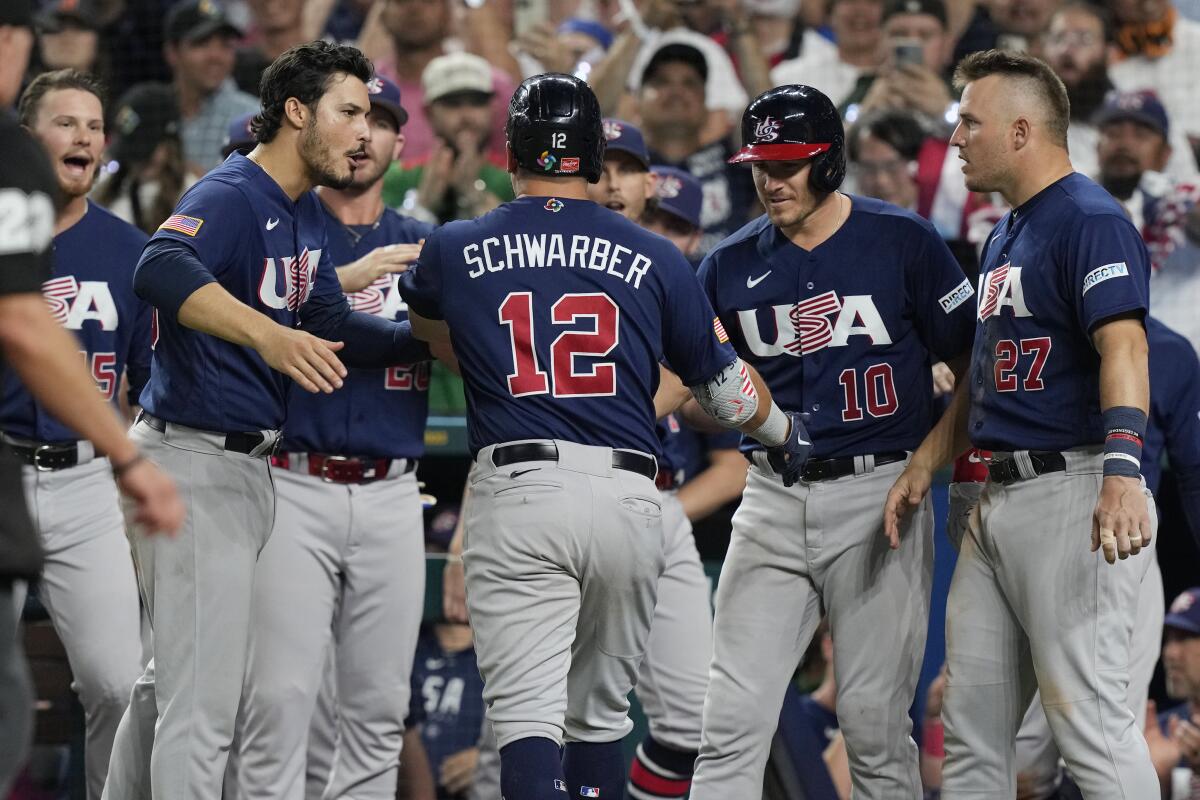
Most eyes in Japan were on the game. A popular high school baseball tournament at Koshien Stadium in Osaka — home of the Hanshin Tigers with a capacity of 50,000 — was sparsely attended. Japanese media speculated it was because people were home watching the national team. With good reason: 62 million people — nearly half the country’s population — watched Japan’s win over South Korea in pool play. That number was more than the most-watched World Series game ever. The hype for Tuesday’s game was greater.
Team USA was on the Japanese team’s minds long before the tournament started. In August, Japan’s manager, Hideki Kuriyama, Ohtani’s manager with the Nippon-Ham Fighters before he signed with the Angels, traveled to the United States for a part recruiting, part scouting trip.
Along the way, he worked to secure the top target on his list: Ohtani, the two-way generational talent Kuriyama has mentored since he turned pro.
Ohtani has been dominant in Major League Baseball over the last two seasons, surpassing any possible expectations since arriving from Japan while cultivating a respect for the competition. He viewed Tuesday’s meeting as the best chance to prove Japan remains a top-tier baseball power.
On Tuesday, Japan’s most famous athlete, an icon who has yet to celebrate his 30th birthday, relayed that message to his team minutes before taking the field in a brief but poignant clubhouse speech.
“From me, just one thing,” Ohtani said. “Let’s stop admiring them. [Paul] Goldschmidt will be at first base; if you look at center, Mike Trout is there; Mookie Betts is in the outfield. There are players known by anyone who plays baseball.
“For just one day ... if you admire them, you can’t surpass them. We came here to surpass them, to reach the top. For one day, let’s throw away our admiration for them and just think about winning.”
Ohtani was the team’s undisputed leader, but he wasn’t the one with the most major league experience or a WBC championship. That was Yu Darvish, 36.
Ohtani was credited with helping recruit Darvish, who participated in his first WBC in 2009 when he blew a lead in the title game before earning the save in a win over South Korea. Darvish then chose to become the only major league player to attend Japan’s training camp last month over reporting to spring training to create a sense of camaraderie with the younger players.
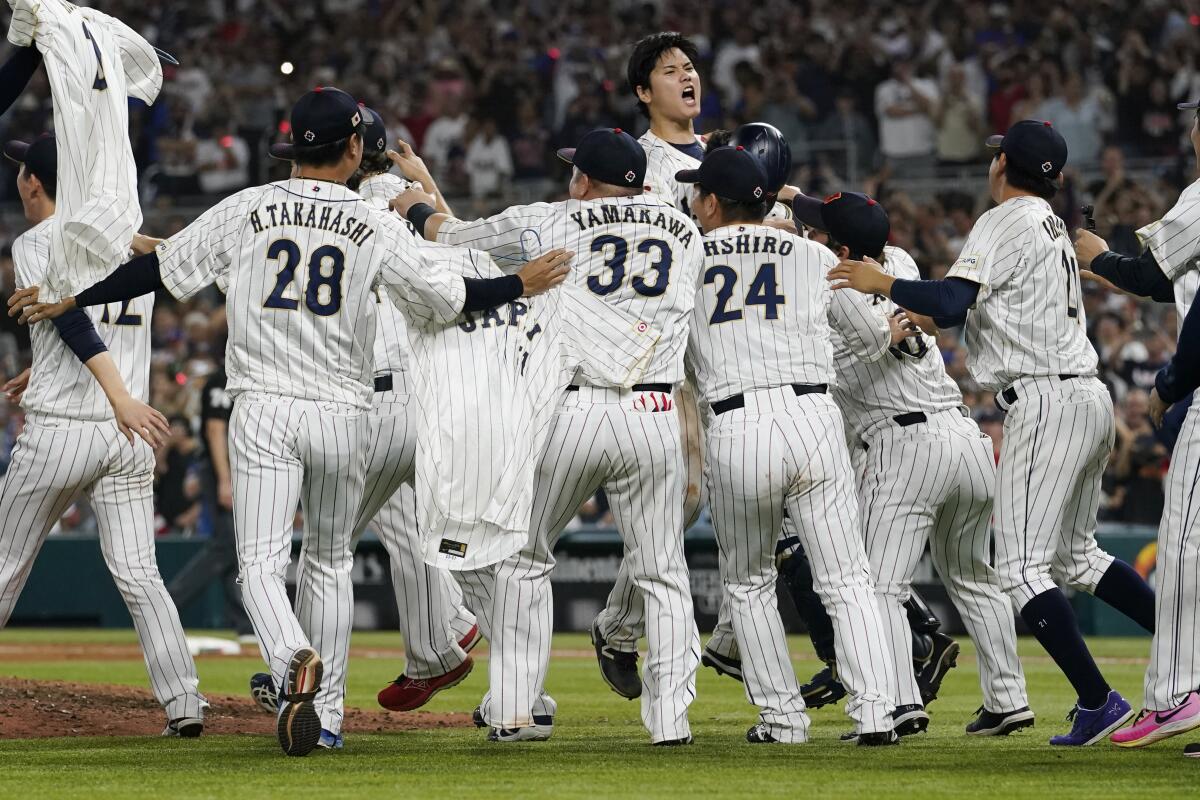
Darvish, like Ohtani, was available to pitch Tuesday after pitching in the quarterfinals Thursday. The Angels, however, would allow Ohtani, who had never pitched on fewer than five days’ rest, to pitch just one inning, limiting him to a relief appearance.
The San Diego Padres, on the other hand, cleared Darvish to pitch without any known limitations. He was expected to start, but Japan surprisingly chose to start left-hander Shota Imanaga over the veteran right-hander.
Darvish walked to Japan’s bullpen during the fifth inning Tuesday. Ohtani followed him before the start of the sixth. The movement sparked attention. Time was running out for the U.S., and two of the best pitchers in the world were potentially waiting.
By then, Japan had a 3-1 lead. U.S. shortstop Trea Turner opened the scoring with another home run — his fifth of the tournament — off Imanaga in the top of the second inning. The five home runs, four of which came in Team USA’s three knockout stage games, tied the record for a WBC.
The lead was fleeting. Japan tied the score on a solo home run from Munetaka Murakami — the slugger who delivered the walk-off double to beat Mexico in the semifinals the previous night — off U.S. starter Merrill Kelly in the bottom of the second. Later in the inning, after Angels left-hander Aaron Loup replaced Kelly, Lars Nootbaar, the first player not born in Japan to ever play on its national baseball team, gave Japan a 2-1 lead with an RBI groundout.
Kazume Okamoto’s solo home run against left-hander Kyle Freeland doubled the margin in the fourth inning. From there, the teams went scoreless for three innings until the eighth, when Darvish took the mound.
The 2023 World Baseball Classic is underway. Here’s everything you need to know about this year’s fifth edition of the international baseball tournament.
Darvish’s only previous experience in a winner-take-all championship was his disastrous start in Game 7 of the 2017 World Series for the Dodgers. He gave up five runs in 1⅔ innings. The Dodgers lost, and Darvish wore the blame.
Darvish, who said he had trouble warming up, was wobbly again Tuesday. Kyle Schwarber cut Team USA’s deficit to one when he blasted a solo home run to the second deck with one out. Turner then singled. But Darvish avoided a debacle this time. J.T. Realmuto popped out and Cedric Mullins flied out to end the threat. Japan’s dugout erupted. The lead remained intact for Ohtani.
All Ohtani needed was 14 pitches to add another unprecedented accomplishment to his ledger. Nobody hit a ball harder, threw a pitch faster or clubbed a ball farther in the WBC than Ohtani. Never has modern baseball seen a talent like him. On Tuesday, with the baseball world watching, he proved it again. He became Mr. March. Next, he hopes, is a chance in October with Trout.
“I’d think it’d be the ultimate year if I can surpass, or approach, this,” Ohtani said, “at the end of the season.”
Times columnist Dylan Hernández contributed to this story.

More to Read
Go beyond the scoreboard
Get the latest on L.A.'s teams in the daily Sports Report newsletter.
You may occasionally receive promotional content from the Los Angeles Times.

